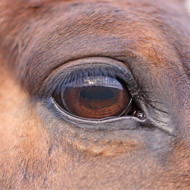
Arabian show horse at risk of breathing problems
UK vets have expressed their horror at images of an Arabian horse that has been bred to achieve an extreme concave or ‘dished’ profile.
Speaking to Veterinary Record, UK equine expert Tim Greet said: “I wondered at first whether this was a 'photoshop' joke, but clearly it is intended to be deadly serious - which of course is what it is - truly horrific! Arabians have always had a rather “dished” face but this takes things to a ridiculous level.”
The horse, El Rey Magnum, is a nine-month-old colt bred by Orrion Farms - a specialist Arabian breeding farm in Washington, USA. Valued by his owners at several millions of dollars, he was launched earlier this month in a promotional video that appears to have been removed from the farm's website.
Doug Leadley, primary breeding advisor for Orrion, said: “There is never perfection but I think this horse is a stepping stone to perfection…he is very proud of himself, he has exceptional tail carriage. He loves to move and he sure appears to be show-healthy, bouncy and fast.”
News of El Rey sparked interest from horse breeders and trainers across the world. However, reaction on social media has been mixed, with some declaring the horse beautiful and others shocked and appalled.
Jonathan Pycock, equine reproduction expert and president of the British Equine Veterinary Association, said the horse represented a radical variation on what was normal. He stated the head shape with a dipped nose "served no functional purpose and could put the horse at risk of breathing problems".
Roly Owers, equine vet and chief executive of World Horse Welfare, also commented: “This appears to be breeding in a weakness that could severely affect future generations - and if there is not a restriction to the airway in this particular animal already then there will be in future generations.”
Animal welfare and ethics expert Madeleine Campbell said: “Whilst it is impossible to comment on an individual animal based on photographic evidence, as a general principle any trend towards breeding for extremes of form which might adversely affect normal function must be condemned, on welfare grounds.
“This would apply equally to head shape which might compromise the ability to breathe or eat normally or, for example, to extremes of animal size which might compromise the ability to give birth normally.”
Vets in the USA have identified El Rey as an example of an extreme breed. However, one vet confirmed the horse had no medical issues or respiratory issues.



 The Veterinary Medicines Directorate (VMD) is inviting applications from veterinary students to attend a one-week extramural studies (EMS) placement in July 2026.
The Veterinary Medicines Directorate (VMD) is inviting applications from veterinary students to attend a one-week extramural studies (EMS) placement in July 2026.